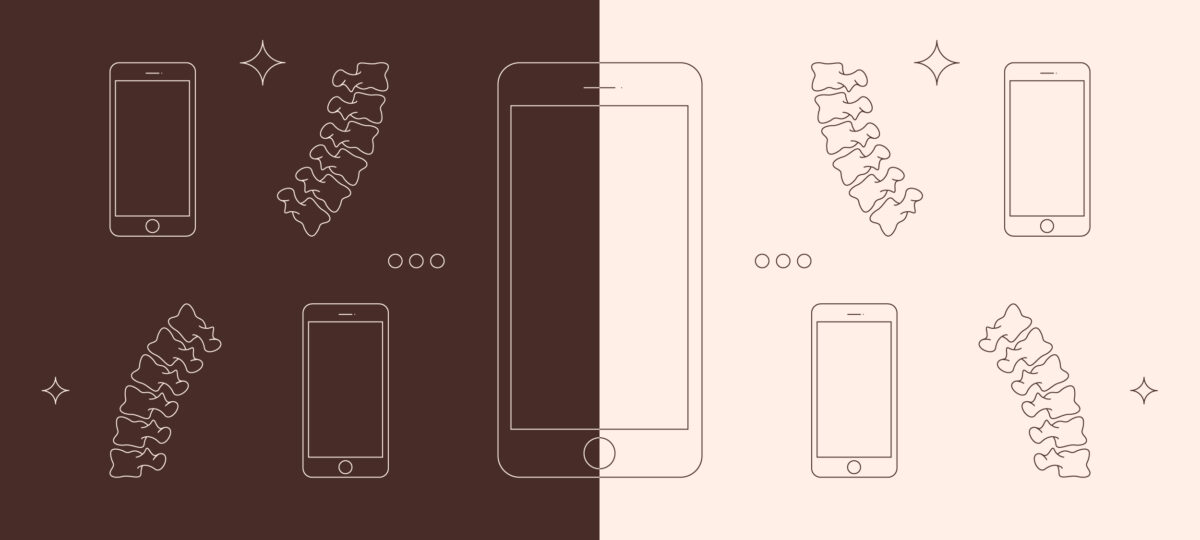A term that came to be around 2008 coined by Dr. Fishman, and literally speaks for itself. It doesn’t discriminate either, as almost every living human being on the planet is at risk, and the only pre-requisite is using a mobile device. When you tilt your head down, known as flexion, there is a significant strain of the muscles and bones of the back of your head and neck. These tissues are holding the weight of your skull in a prolonged compromising position while you zone out scrolling through Instagram BBQ videos (I am guilty of this) or firing emails to your boss’s boss.
Repetitive flexion for short spurts are just as detrimental as holding it in that position, because you are now instigating muscle memory, and it will become easier and even more comfortable to sit hunched over rather then fight against the discomfort of sitting in an ideal posture. A great comparison for muscle memory is with the help of my husband, Mark. He used to swim competitively from the ages of 12-18, and I’m going to brag that he was quite built. Since stopping, muscle tone decreased, adipose tissue (AKA fat) increased and overall health wasn’t at its prime anymore. But, as soon as he started to swim regularly, his muscle definition returned after 2 weeks (I’m pretty sour about that, not going to lie). Muscle memory works with bad muscle behavior too, so it’s up to you to consciously be aware of your body, where your head and arms are positioned, and even your feet.
When your head is in flexion, the muscles on the back (posterior) are working extra hard to try and hold your head in place, yet the muscle fibres are in a lengthened position. If the average person holds their head forward by 30 degrees, that is 40lbs of pressure on your spine. Even more forward? 60lbs. Because of this internal battle that the tissue is going through, other connective tissue like ligaments and fascia start to become affected. Then, muscles that indirectly or directly attach to the back of your neck start a chain reaction of muscle guarding due to an imbalance and this can cause headaches, numbness and tingling down the arms to start. Long-term effects are disc herniation’s, arthritis, and even scarier – reduced lung volume capacity.
So, if you catch yourself suffering from some discomfort in your neck and shoulders, move around and stretch to give yourself, and your neck a break. A great exercise of basic range of motion, is to roll your head in a very slow circle as if you’re following the minute hand of a clock. If you feel stuck or a bit of tightness at any point, just stop in that position and breathe, then move on once you feel you overcame that barrier. But we can’t just stretch to improve posture! Strengthening your upper back and neck is key to prevent your shoulders from rolling forward as well, which comes hand-in-hand with text neck or computer work. I’m sure everyone can agree that they don’t want to have a back like Quasimodo when they’re seniors!
While sitting upright, squeeze the bottom tips of your shoulder blades together and let go for 10 repetitions, for 3 sets once a day. After a couple of weeks you might find that you can sit a little more straighter, and it’ll be easier too. Now comes an exercise that looks a bit ridiculous, but I can attest that it works. All you need to do is tuck your chin in to give yourself a very attractive double chin, and let go. Same idea for the shoulder blades, 3 sets of 10 repetitions, and that’s it! You’ll really only be dedicating about 5 minutes of your time a day, for a big reward. However, you’ll need to be consistent for long-term success. If you feel like you need a bit of extra help, a Registered Massage Therapist or Chiropractor would be great to see if there might be an underlying condition to treat, and to come up with an appropriate treatment plan made for you. A Strength & Conditioning coach is an ideal member of your health team as well, as they can assess, and develop a program to help your needs for your body

Subscribe to our newsletter!
The medical information on this site is provided as an information resource only, and is not to be used or substituted for any diagnostic or treatment purposes. The information we provide is for general use. Always seek the guidance of your doctor or other qualified health professional before making any medical decisions.
If you think you may have a medical emergency, call your doctor, go to the nearest hospital emergency department, or call the emergency services immediately. If you choose to rely on any information provided by The Honesty Policy, you do so solely at your own risk.
